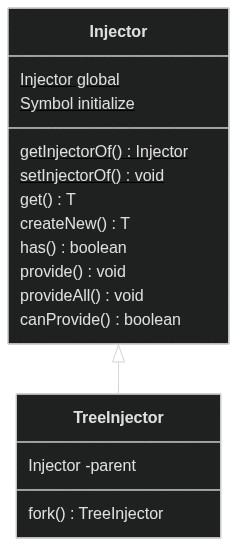@homebots/injector
v1.6.4
Published
Dependency Injection library in Typescript
Downloads
16
Readme
@homebots/injector
Depedency Injection library for any project, written in Typescript
Introduction
The library exports a "global" injector, which can be used as-is to inject everything. It's called Injector.global. You can pair that with the "inject" function exported in the library.
But if you need to nest injectors and have a tree of dependencies, use TreeInjector instead.
How it works
There are two ways of using injections:
using a global injector: the library exports
Injector.global, a singleton object that can be accessed from anywhere and used as the injector of an entire app.using a tree of injector with the ability to override classes/tokens on each level. The library exports a class,
TreeInjector, which can be instantiated as a starting point, and forked as needed to create children. See documentation below for more details.
First you create a class:
class ElectricCar {}That class can have one or more dependencies. You can declare them with a decorator:
class Battery {}
class Motor {}
class ElectricCar {
@Inject() battery: Battery;
@Inject() motor: Motor;
}But sometimes you don't have a concrete value just yet, or the value is not an object. Maybe you just want to have a placeholder.
You can do that using an InjectionToken:
import { Injector, InjectionToken } from '@homebots/injector';
export const CarColor = new InjectionToken<string>('color');
export class ElectricCar {
@Inject(CarColor) color: string;
// or
get color() {
return inject(CarColor);
}
}But who is gonna provide the CarColor? You can declare a provider for it:
import { Injector, Value } from '@homebots/injector';
Injector.global.provide(CarColor, Value('blue') });
// or
provide(CarColor, Value('blue') });You can also replace the implementation of classes:
import { Injector, provide } from '@homebots/injector';
class Motor {}
class ElectricMotor {}
provide(Motor, ElectricMotor);
class Car {
// 'motor' will have an instance of ElectricMotor
@Inject() motor: Motor;
}Examples
import { Injector, TreeInjector, Value, Inject, InjectionToken } from '@homebots/injector';
const Color = new InjectionToken('color');
class Battery {}
class Engine {}
class GasolineEngine extends Engine {}
class ElectricMotor extends Engine {
@Inject() battery: Battery;
}
class Car {
@Inject() engine: Engine;
@Inject(Color) color: string;
}
// common injector for all cars
const baseInjector = new TreeInjector();
baseInjector.provide(Color, Value('black'));
// branch off to provide electric car dependencies
const electricCarInjector = baseInjector.fork();
electricCarInjector.provide(Engine, ElectricMotor);
electricCarInjector.provide(Car);
// branch off again to provide gasoline car dependencies
const gasolineCarInjector = baseInjector.fork();
gasolineCarInjector.provide(Engine, GasolineEngine);
gasolineCarInjector.provide(Car);
const electricCar = electricCarInjector.get(Car);
const gasolineCar = gasolineCarInjector.get(Car);
expect(electricCar.engine instanceof ElectricMotor).toBe(true);
expect(gasolineCar.engine instanceof GasolineEngine).toBe(true);
expect(electricCar.color).toBe('black');API
Injector
- get(token)
Retrieves a value for a given injectable token. The token can be either a Class or a InjectionToken.
Values are cached once they are resolved, so constructors and factories will be singleton.
- createNew(token)
Retrieves a value for a given injectable token. The token can be either a Class or a InjectionToken.
Values are never cached.
- has(token)
Check if the injector has a value stored for a given token. Returns false before the first time the token is retrieved, true otherwise.
- canProvide(token)
Checks if a token can be provided by this injector. It differs from has() because it just checks for the possibility of an injection.
- provide(Class)
- provide(Class, SubstitutionClass)
- provide(AbstractClass, Class)
- provide(InjectionToken, Class)
- provide(InjectionToken, factory)
Declares an injectable type.
factory is a function that returns a value.
It can be a static value, in which case the Value wrapper should be used
It can also be dynamic value. For that case, pass a function to Factory, and optionally an array of dependencies.
Example:
class A { number = 1 }
class B { number = 2 }
const C = new InjectionToken<number>();
const T = new InjectionToken<number>();
injector.provide(C, Value(3));
injector.provide(T, Factory(
(a: A, b: B, c: number) => a.number + b.number + c,
[A, B, C]
));
expect(injector.get(T)).toBe(6);TreeInjector
- fork()
- fork(Injector)
Creates a new injector that can hold its own provided dependencies. If a provider is not found, it will look at its parent for dependencies. A parent can be provided at construction time. By default it points to the root injector.

